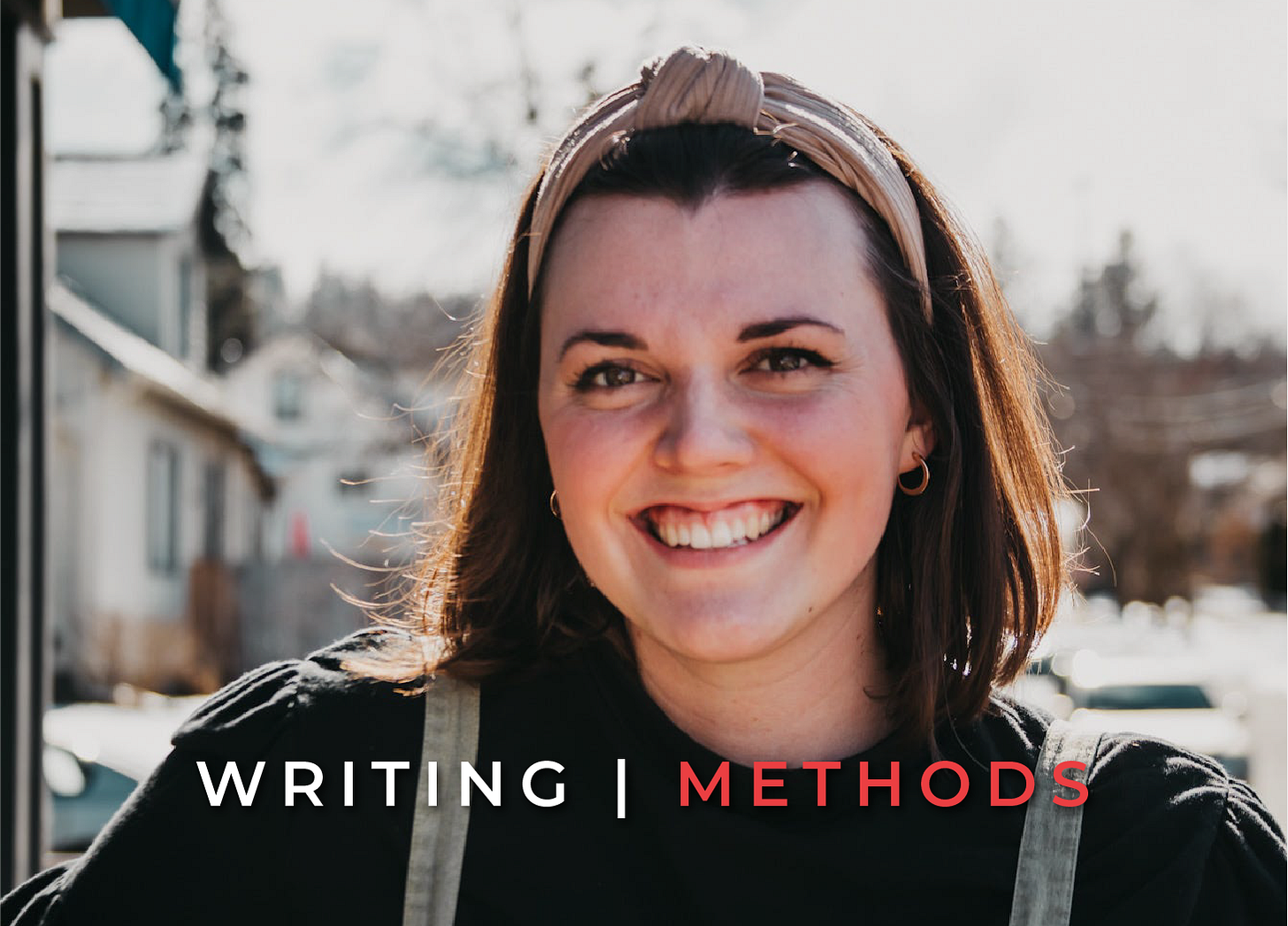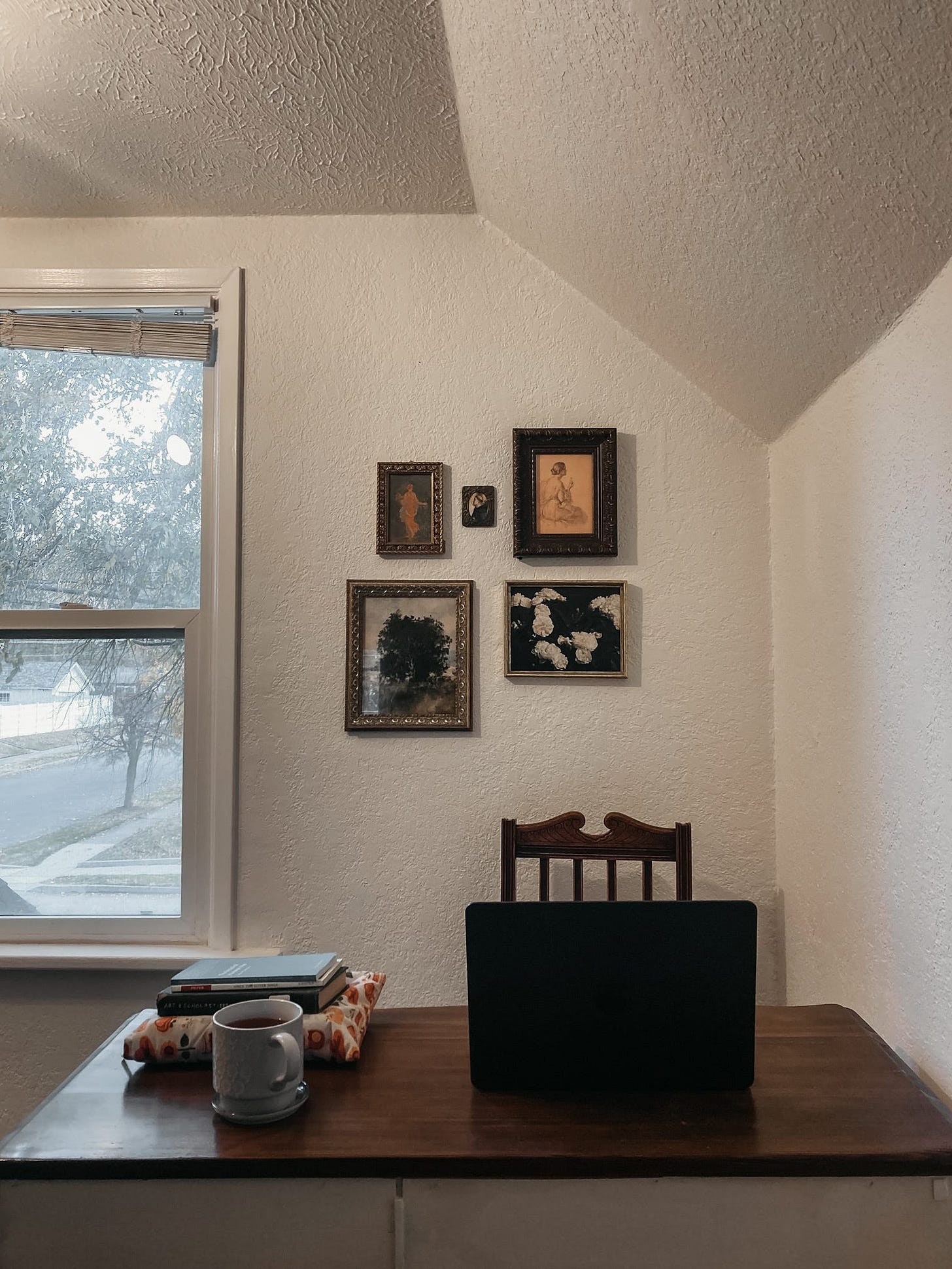How to Make Faith Central to Your Writing Process
Author Maddie Dobrowski on how prayer and reflection inspire her writing
Hey, welcome to Methods—the series where we explore the creative habits of fellow Substack writers.
This week, we are featuring Maddie Dobrowski.
Maddie is a high school teacher, philosophy student, and author. Her Substack, Love of Literature, is dedicated to exploring themes of goodness, truth, and beauty in literature, with a primary focus on the classics.
She is also the author of The Lord of the Rings and Catholicism.
In this interview, Maddie shares:
Why she begins each writing session with a prayer
The value of collaboration and feedback in her writing
How her writing routine has evolved and the importance of setting time for writing
Enjoy!
Know someone with a unique creative process? Drop their name in the comments—I’d love to feature them!
Evolving Writing Routine
My writing routine has changed over the years, depending on my schedule and state in life.
When I began writing my first book, the whole world was in quarantine. Back then, I would wake up early, grab a cup of coffee and a baked good, and sit for exactly one hour in front of my computer, typing away. Ah, the bliss.
Nowadays I have a much busier schedule. I am preparing to write my MA thesis, and I also teach high school students during the week. So, I fit my writing in around my other intellectual work.
If I am going to sit down and do an hour of grad school work, I will take an extra 30 minutes or so to write. Some days I don't get to it, but even those small 15-20 minute slices of time are crucial to making forward progress on my projects.
Actually scheduling in time for writing when I sit down to organize my daily routine helps a lot. If you don't plan for it, it probably won't happen.
Pre-Writing Rituals - Prayer And Purpose
I do try to begin every work session in prayer. My favorite one is the "Prayer Before Writing or Preaching" from St. Thomas Aquinas. When I wrote my book on The Lord of the Rings, I began each writing session with a Hail Mary.
As a Christian I believe that fiction is a powerful tool for opening hearts to truth, beauty, and goodness. I personally only want to write a story if I feel that I am truly called to write it. In that case, if I have prayed about it and feel led to create this story, I try to lean into that trust and be open to discerning where the story should go.
Usually I get a sense, or a nudge, or whatever you might call it, that I need to take the story in a certain direction. I am ultimately coming up with the ideas, but I do think that if you are called to write, that means you have a story to tell. Whether it be fiction, non-fiction, books, or articles, each writer has something they are meant to create. I believe it is part of my job as a writer to discover what that purpose is and then do it.
See Also: Steven Pressfield begins each writing session with a prayer to the muse
The Home Library Office
I usually write in our home library/office. It is a hobbit-sized "bedroom" at the front of the house, on the second floor. A small desk takes up one corner of the room, and the other half is occupied by a reading chair and bookshelves. It overlooks the street in front of our house.
As writing spaces go, it is quite small and unromantic. But I have decorated it to exude peace and encourage creativity, and it has been perfect for that.
Tools for Productivity and Inspiration
I usually write on my laptop, although I have found that when my words are not flowing as well as I would like, putting away the screen and writing my ideas out by hand does wonders for productivity. The scenes take shape in my mind much easier when I am writing by hand.
Whenever I have a snippet of writing, whether it be a random line that comes to mind, a rhyme, or an idea, I put it down immediately in my notes app.
I have found that if I do not record it right away, I will forget about it, no matter how good of an idea it was. Some of these ideas I never revisit, but many of them have found a home in my current WIPs.
As far as research tools, I like to gather books from the library and other sources on the topic I am writing about. Right now, I am working on a fiction project, so I am diving into obscure mythologies and folklore. I also like to immerse myself in the imagery of the world I am creating by going for long walks and scratching down half-baked descriptions of the natural scenery.
Literary Influences
I would say my biggest influence as far as style is probably C.S. Lewis. There is not one book of his that I have not enjoyed; and more than simply enjoying his writing, I find myself relating as an author to his writing style. I wouldn't dare to put myself on his level, but by drinking in both his fiction and non-fiction, I have found my own writing improving.
On a broader level, I would say classic literature in general has greatly impacted me as a writer. This is true for any genre, but especially for literature from the Victorian era.
I am not currently writing anything related to that style of storytelling, but the elegance of writers like Jane Austen, Thomas Hardy, and Elizabeth Gaskell has helped me to improve my vocabulary and elevate both my fiction and non-fiction.
Habits That Spark Creativity
Two things come to mind.
First, I am blessed to be a part of a wonderful writers club in my area. The people who attend are like-minded in their beliefs about the power and purpose of writing. They have been immensely helpful to me and I am deeply indebted to their feedback.
Second, ever since I have started writing seriously I have found that taking walks in nature enhances and sparks my desire to write. Being surrounded by the beauty of the natural world inspires a wonder in me that I think is central to my own style as a writer.
For another writer that’s inspired by nature check out my interview with Anne of Baggebo
Embracing Collaboration
I think I have become more open to feedback and more invested in collaboration as an essential part of the creative process. I used to be of the mindset that creativity happens in isolation.
But after joining the writers club I am a part of and reading Diana Glyer's book Bandersnatch, I have come to recognize that creativity happens in community. Collaboration is not a sign of a lack of individual genius, but a mark of humility. Most of the best works of literature came out of collaboration.
My own work is forever better because of those who took the time to read it and provide thoughtful feedback.
For more on collaboration check out: Toni Morrison On What Makes A Good Editor
Thanks, Maddie!
Check out her book The Lord of the Rings and Catholicism, available on Amazon.
Subscribe to Writers Are Weird
Access the full archiveDocumenting the creative process. Written by Sam Mas






